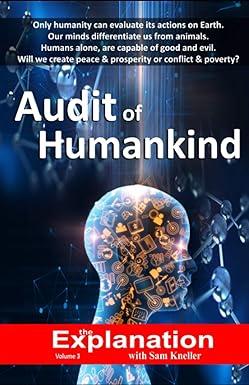Question
What is the difference between generally accepted accounting principles (GAAP) and AICPA generally accepted auditing standards (GAAS)? A CPA rm does not guarantee the nancial
What is the difference between generally accepted accounting principles (GAAP) and AICPA generally accepted auditing standards (GAAS)?
A CPA rm does not guarantee the nancial soundness of a client when it renders an opinion on nancial statements, nor does the CPA rm guarantee the absolute accuracy of the state- ments. Yet the CPA rms opinion is respected and accepted. What is expected of the CPA rm in order to merit such con dence?
d. Financial statement audits performed under PCAOB requirements are designed to provide
which type(s) of assurance with respect to the detection of material misstatements due to errors or fraud?
Reasonable
Absolute
(1) Yes Yes (2) Yes No (3) No Yes (4) No No
The general group of the 10 PCAOB Auditing Standards requires that:(1) The auditors maintain an independent mental attitude.(2) The audit be conducted in conformity with generally accepted accounting
principles.(3) Assistants, if any, be properly supervised.(4) The auditors obtain an understanding of internal control.
i. An audit provides reasonable assurance of detecting material:
Fraudulent Financial Reporting
(1) Yes (2) Yes (3) No (4) No
Misappropriation of Assets
Yes
No Yes No
Audit rms that are subject to inspections by the PCAOB staff include: (1) All audit rms.(2) Audit rms that are registered with the SEC.(3) Audit rms that are registered with the PCAOB.
(4) Audit rms that are registered with a state board of accountancy.
State whether each of the following is or is not a principle (or a portion of a principle) underly- ing an audit conducted in accordance with Generally Accepted Auditing Standards.
| Principles | Yes (Y) or No (N) |
| 1. The purpose of an audit is to provide nancial statement users with an opinion by the auditors on whether the nancial statements are presented fairly, in all material and immaterial respects, in accordance with the applicable nancial reporting framework. |
|
| 2. The auditors are responsible for having appropriate competence and capabilities to perform the audit. |
|
1
whi25613_ch02_033-065.indd 62 02/11/
62 Chapter Two
| Principles | Yes (Y) or No (N) |
| 3. The auditors are unable to obtain absolute assurance that the nancial statements are free from material misstatement. |
|
| 4. The opinion states whether the nancial statements are presented fairly, in all material respects, in accordance with the applicable nan- cial reporting framework. |
|
| 5. Inherent limitations of an audit include the need to conduct an audit to achieve a balance between the bene t to management and the bene t to the auditors. |
|
237. Bart James, a partner in the CPA rm of James and Day, received the following memorandum from John Gray, president of Gray Manufacturing Corporation, an audit client of many years. Dear Bart:
I have a new type of engagement for you. You are familiar with how much time and money we have been spending in installing equipment to eliminate the air and water pollution caused
Term
. A report providing a summary of ndings
. A report providing reasonable assurance
. An error
. Financial reporting framework
. Fraud
. Inspection
. Quality control elements
. Registered public accounting rm
Partial (or Complete) De nition or Illustration
1. A CPA rm that may conduct only audits of public companies
2. A CPA rm that may conduct audits of public or non- public companies
3. Agreed-upon procedures report4. A review of a CPA rm conducted by PCAOB 5. An independent peer review6. An unintentional misstatement7. Audit report8. Generally accepted accounting principles9. Generally accepted auditing standards
10. Human resources and monitoring11. Independence and reasonable assurance 12. Misappropriation of assets13. Review report
Required:
LO 2-6
1
whi25613_ch02_033-065.indd 63 02/11/
Required:
In-Class Team Case
by our manufacturing plant. We have changed our production process to reduce discharge of gases; we have changed to more expensive fuel sources with less pollution potential; and we have discontinued some products because we couldnt produce them without causing consid- erable pollution.
I dont think the stockholders and the public are aware of the efforts we have made, and I want to inform them of our accomplishments in avoiding danger to the environment. We will devote a major part of our annual report to this topic, stressing that our company is the leader of the entire industry in combating pollution. To make this publicity more convinc- ing, I would like to retain your rm to study what we have done and to attest as independent accountants that our operations are the best in the industry as far as preventing pollution is concerned.
To justify your statement, you are welcome to investigate every aspect of our operations as fully as you wish. We will pay for your services at your regular audit rates and will publish your pollution opinion in our annual report to stockholders immediately following some pictures and discussion of our special equipment and processes for preventing industrial pol- lution. We may put this section of the annual report in a separate cover and distribute it free to the public. Please let me know at once if this engagement is acceptable to you.Put yourself in Bart Jamess position and write a reply to this clients request. Indicate clearly whether you are willing to accept the engagement and explain your attitude toward this pro- posed extension of the auditors attest function.
.
Step by Step Solution
There are 3 Steps involved in it
Step: 1

Get Instant Access to Expert-Tailored Solutions
See step-by-step solutions with expert insights and AI powered tools for academic success
Step: 2

Step: 3

Ace Your Homework with AI
Get the answers you need in no time with our AI-driven, step-by-step assistance
Get Started


